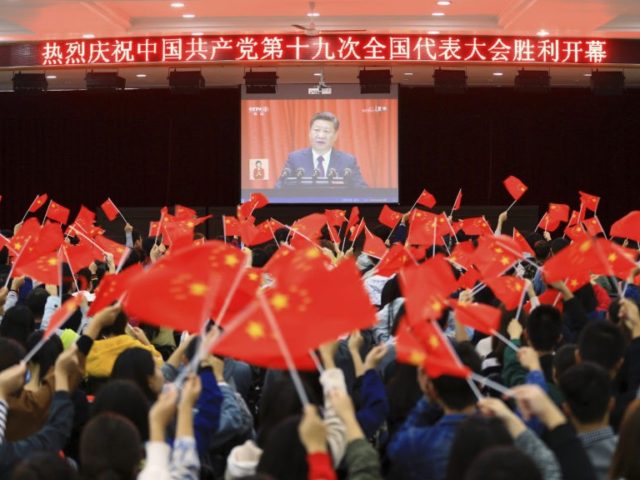China’s Central Commission for Discipline Inspection, the top anti-corruption agency in a government desperate to portray itself as dedicated to rooting out corruption, announced a new crusade against “hedonism and extravagance” on Monday.
The idea is to prevent officials from using lavish parties, padded travel expenses, and other perks as a means of concealing graft.
Judging by Chinese media accounts excerpted by Reuters, one of the practices vexing the committee is “recuperation,” mini-vacations ostensibly to help top officials recover from the stress of their demanding jobs. Weddings and funerals are also portrayed as opportunities to hide payoffs to politicians, through such practices as “staggering gift-giving and accepting electronic gift cards or ‘red packets’ of money via online payment platforms.”
As with most Western media outlets, Reuters uncritically cites Chinese government pronouncements and its state-run media to portray President Xi Jinping as a devoted and highly successful foe of corruption:
President Xi Jinping has waged a five-year war on graft at all levels of the ruling Communist Party, from high-level “tigers” to lowly “flies” and has pledged to keep up the fight until officials dare not, cannot and do not want to be corrupt.
A crackdown on hedonism and extravagance in a drive to improve professionalism is to go on in Xi’s second term, an unidentified official from the Central Commission for Discipline Inspection told the official Xinhua news agency.
“Efforts to address such misconduct should not be stopped and the work to improve the party’s conduct and work styles should never end,” Xinhua cited Xi as saying in a personal stamp of approval.
Anyone waiting for the Xinhua news agency or Chinese Communist Party newsletters to publish searing exposes of what is really going on behind the scenes of Xi’s war against corruption is likely to be disappointed. It is nevertheless amusing to read between the lines and note how many bureaucratic con jobs and payoff scams continue to plague China’s immense bureaucracy despite Xi’s years of effort to clean the system up.
Reuters quotes anti-corruption officials complaining about cooked books, lazy local governments, and “excessive formalism,” which seems to mean shuffling a lot of paperwork without actually getting anything done. That is the story of bureaucracy everywhere, but Chinese officials have elevated it to an art form, leaving the Central Commission for Discipline Inspection to fume that “cadres fond of formalism and bureaucratism who create a negative influence or grave results will be strictly punished, without tolerance.”
NPR took a long look at Xi’s anti-corruption crusade in October. As with most such stories from China, it is mostly a collection of conflicting rumors. The obvious theory holds that Xi used corruption charges to crush his political rivals and consolidate power. There certainly might have been some of that going on, but it seems inadequate to explain Beijing’s mania for cracking down on low-level officials in the hinterlands accused of petty offenses like padding their expense accounts. Several expert commentators told NPR there had to be more to the story than Xi opportunistically locking up a few troublesome political rivals.
Another theory is that Xi saw anti-corruption as a perfect excuse for consolidating power, by making the argument that only a powerful centralized anti-graft agency and his own elevation to virtual dictatorship could impose honesty on the Chinese system. A third is that the Communist Party was seriously worried about a popular uprising against corrupt officials and took action to defuse public anger.
The most interesting theory is that Xi, who is 64 years old, is trying to create a populist legacy of honest government that will outlast him. “He wants to create a system that will survive after him. And in that sense, he is a kind of member of this Chinese elite that has a sense of mission about the country as whole,” Arthur Kroeber of Gavekal Dragonomics told NPR.
There is also the matter of China’s huge “One Belt, One Road” international infrastructure project, which will demand considerable confidence in the Chinese government from its partners. Chinese minister Wang Yajun spoke of China’s desire to build a “clean corridor, a corridor of integrity” in a trip to Pakistan on Monday, for example.
One other potentially disturbing aspect of Xi’s anti-corruption crusade to consider is that a great deal of the corruption occurs within China’s military apparatus, which is huge and extends into sectors of the nominally civilian economy. Cleaning up the military could be seen as the bureaucratic equivalent of cleaning out a gun before firing it.
“Corruption in the armed forces is so pervasive that it threatens to undermine China’s ability to wage war,” the South China Morning Post noted last week. “In the past five years, 13,000 PLA officers, including more than 100 generals, have been investigated and disciplined. Xinhua said the number ‘is even greater than the number of army generals who died on the battlefield during revolutionary times.’ Mathematically, no major military in the world is more corrupt than the PLA, in terms of numbers and the seniority of the servicemen convicted.”
The SCMP adds that much of Xi’s clean-government program has been explicitly presented as a push to modernize the Chinese military. Indeed, as the Diplomat posited in 2014, eliminating graft could be seen as a prerequisite for any further modernization to occur, because otherwise a great deal of the funding allocated by Beijing for military purposes simply disappears into sinkholes of corruption, and too many officers attain crucial high-ranking positions by purchasing their promotions.

COMMENTS
Please let us know if you're having issues with commenting.